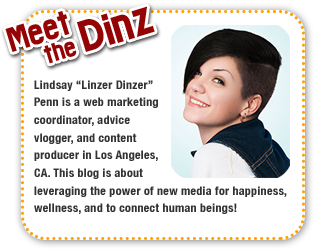When I was a teenager, I believed I was weird. A Weirdy McWeirdo. My friends had more friends than I did and they liked to go out and do things that friends do. I liked to write fan fiction and build websites for whatever my fandom du jour happened to be. The other girls were kissing boys when I was writing about kissing boys I had never met.
But I wasn't weird. Just like you, I was about 90% normal and 10% weird. Just like your mom, your friends, your dentist, and your garbage man - 90% normal, 10% weird. This isn't optimism talking - this is just a matter of pure, cold, hard math. By definition "normal" encapsulates the traits that are most common amongst a group people, therefore you are more likely to have normal qualities than not have them because that's what makes them normal.
But naturally, you're gonna shine a spotlight on your 10% weird. People are fixers, we gotta fix the things we think are broken. We gotta plug the holes in the dams and clip off the hangnails. If we paid as much attention to the things that were fixed as the things that needed fixing, we would never get anything done. Unfortunately that can lead to a rather neurotic, pessimistic life experience.
First of all it's perfectly normal to think your friends are more normal than you are. For one thing, they're the ones who are teaching you what normal is. Secondly, your friends are more popular than you are. Most of them, anyway. No, that's not a sassy joke - prepare for more math.
There are more than 7 billion people in the world. 2 billion of those people are on the Internet, which gives even an 60 year old in Papua New Guinea a shot at being your friend. But you are one in 2 billion people, so someone would have a better chance of winning the lottery than having happened to come through all the perfect circumstances to end up being your friend. It's all a matter of being at the right place at the right time with all the right qualities.
So, if you're the rare winning lottery ticket, doesn't it stand to reason that someone has a better chance of winning you
if they purchase a lot of lottery tickets? A person is more likely to have you as a friend if they have a crap ton of friends, therefore you are more likely to have friends with a crap ton of friends. It has nothing to do with you being weird or them being normal. In fact one could argue that it's a lot more normal to have a small group of friends, and having five thousand friends is kind of weird.
So what is your weird? Let's say you're gay. Well, that is weird. The LGBT community only takes up about
4% of the US population, so I guess it's a done deal. You're a Weirdy McWeirdo.
But are you really? I'm sure being gay isn't the only quality that describes you. You probably like music and movies. You probably have two eyeballs. You probably don't like it when people say mean things to you. You're probably embarrassed when you fart. You're 90% normal and 10% weird. You're a combination of weird and normal pieces-parts.
Everyone has a 10% weird. Some people stay awake all night and sleep all day. Some people have phobias of kittens. And some people have amazing talents in their 10% weird - artists, singers, physicists, contortionists - they use their weird to make a special contribution to this world, but they still have all that normal to connect with the people they share their talent with.
In fact, I think it would be abnormal to not be 10% weird, so looking at it that way, you are 100% normal. Congratulations, normal human. Now go out there and make the most of your 10% weird.
Dinz




